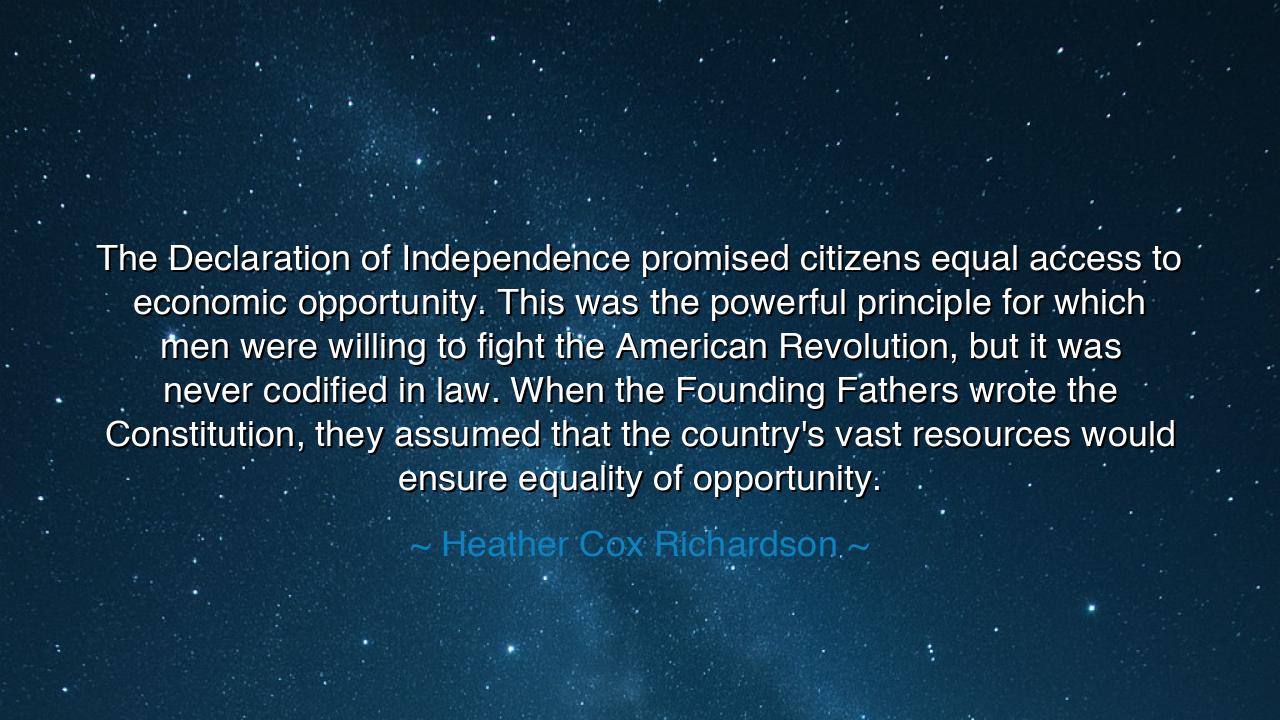
The Declaration of Independence promised citizens equal access to
The Declaration of Independence promised citizens equal access to economic opportunity. This was the powerful principle for which men were willing to fight the American Revolution, but it was never codified in law. When the Founding Fathers wrote the Constitution, they assumed that the country's vast resources would ensure equality of opportunity.






Hear, O future generations, the words of Heather Cox Richardson, who in her wisdom reminds us of a great promise made in the Declaration of Independence: “The Declaration of Independence promised citizens equal access to economic opportunity. This was the powerful principle for which men were willing to fight the American Revolution, but it was never codified in law. When the Founding Fathers wrote the Constitution, they assumed that the country’s vast resources would ensure equality of opportunity.” These words carry with them the weight of history, the fire of ambition, and the sorrow of a promise left unfulfilled. Let us pause and reflect, for in this simple truth lies a powerful lesson for us all.
In the earliest days of the American Revolution, the cry for freedom rang out across the land. It was not only the desire to free themselves from the shackles of a distant king, but also the yearning for opportunity, for a chance to stand as equals among men. The Declaration of Independence spoke not just of liberty, but of the sacred right to economic opportunity, a right that, in the eyes of the rebels, was as important as any political freedom. For they knew, deep in their hearts, that freedom without the ability to earn, to work, to build a future, is no true freedom at all. Yet, as Heather Cox Richardson so rightly points out, this noble promise, though spoken loud and clear, was never codified into the laws that followed.
The Founding Fathers wrote a Constitution for a new nation, but their vision, though vast, was not fully realized. They believed, in their wisdom, that the land itself would provide the means for equal opportunity. America’s great wealth of natural resources—its fertile lands, its rivers teeming with life, its mountains filled with minerals—was seen as a guarantee of prosperity for all. In the minds of those who forged the nation, the very land was the key to economic freedom, and with it, the promise of equality. They thought that equality of opportunity would emerge naturally from these vast resources, but the challenge lay not in the land, but in the systems that would govern the people who sought to claim it.
Yet, history has shown us that opportunity is not so easily won. As the centuries passed, the dream of equal access to prosperity became a distant echo, a whisper against the roar of inequality. While some found their fortunes on this vast land, others were left behind, burdened by the weight of poverty, discrimination, and unjust systems that denied them the very opportunities promised. The Homestead Act, which sought to distribute land to those willing to work it, was one such effort, yet even this noble act often excluded certain groups, most notably Indigenous peoples and Black Americans. Slavery, that great stain upon the nation’s soul, denied millions their freedom and their rightful access to the very resources the Founders had hoped would ensure equality. Thus, while the dream of equality remained, the reality often fell short.
Consider, O children of wisdom, the story of Frederick Douglass, who rose from the chains of slavery to become one of the most powerful voices for freedom and equality in the history of the nation. Born into the brutal system of slavery, Douglass had no access to the economic opportunities that were supposed to be available to all. Yet, through sheer determination, he taught himself to read, and through his words, he shook the nation. Douglass was living proof that the principle of economic opportunity had been denied to many, and his life’s work was a testament to the strength of the human spirit in the face of injustice. He fought not just for his own freedom, but for the freedom of all those who were denied the opportunity to make a life for themselves.
What lesson, then, shall we take from these reflections, O seekers of truth? The promise of economic opportunity is no mere ideal; it is a sacred trust that each generation must strive to fulfill. While the Constitution may not have guaranteed this opportunity explicitly, it is our duty—our responsibility—to ensure that the resources of the land are not hoarded by the few, but shared by all. True freedom cannot exist where there is inequality, and true equality cannot exist where there is no access to opportunity. This is not just a matter for the rich or the powerful, but for each of us, for every citizen who seeks to build a life of dignity and purpose.
Therefore, let us stand firm, O children of wisdom, and take up the cause of true equality in our time. Let us work to create a society where economic opportunity is not a privilege for the few, but a right for all. We must ensure that the promise made in the Declaration of Independence is not left to wither in the shadows of history, but is realized in the lives of every man, woman, and child. Let us not rest until the words of the Founding Fathers—that all men are created equal—are brought to their fullest truth, and the land that was meant to provide opportunity for all truly does so.






AAdministratorAdministrator
Welcome, honored guests. Please leave a comment, we will respond soon